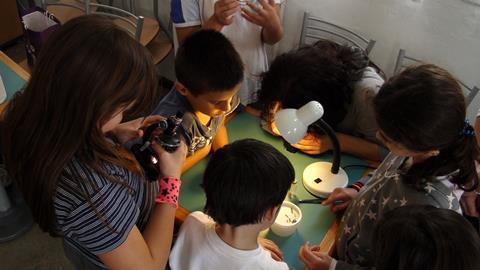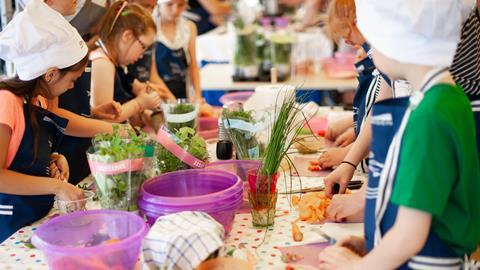The citizen’s perception of microorganisms is generally negative, due to their association with disease and food spoilage. However, the vast majority of the planet’s microorganisms are not pathogenic.
Microbiomes have crucial roles in maintaining life on Earth, and their functions drive human, animal, plant and environmental health. The microbiome research landscape is developing rapidly and is performed in many different fields using similar concepts, albeit in general, one (eco)system at-a-time. Thus, we are only starting to unravel and understand the interconnectedness of microbiomes across the ecosystem.
The microbiome is a topic where transdisciplinary research is essential. In terms of education, this is an excellent opportunity because it provides the possibility for students to explore different fields of knowledge, whilst also increasing complexity and requests specific skills to be properly addressed. The latter is also relevant when considering the abilities that educators should possess. As the body of knowledge generated by microbiome research rapidly evolves, it is virtually impossible for schools to keep up with spreading the latest research findings among students. Increased efficiency in the transfer of knowledge from scientific institutions to schools in the field of microbiome research is of vital importance.
Microbial literacy in society
There is an urgent need for microbiology literacy in society. The case for microbiology literacy has been made in an Editorial published in 2019. The International Microbiology Literacy Initiative (IMiLI) was launched with the goal of creating microbiology literacy through the development of a microbiology school curriculum and supporting resources, all of which will be made freely available. The aim of the Initiative is not to create microbiologists, but rather to engender new adult generations that know enough about relevant microbiological processes to be able to take informed evidence-based decisions at personal, family, community, national and international levels. To do this, the IMLI seeks to generate curiosity and excitement about microbes and their activities in children, and to inform them how microbes affect us in our everyday lives and how important such activities are for our wellbeing and that of the planet. The relevance of microbes and their activities to sustainability, to attainment of the Sustainable Development Goals (SDGs), and to Grand Challenges, are revealed and proposed for class discussions. The IMLI is a truly international effort currently involving more than 500 well-known and to-be-well-known microbiologists from many countries. This number will without doubt eventually become 1000+ and thereby constitute a huge international collaboration whose goal is to make society better and fitter for its stewardship of humanity and the planet. The IMiLI was presented at the ‘Education in Food Systems Microbiome Related Sciences: Needs for Universities, Industry and Public Health Systems’ MicrobiomeSupport workshop by Prof. Dr. Kenneth Timmis.
Educational Resources
We are living in a historical moment where traditional paradigms in education are judged and sometimes criticised. From a content-based approach we are transiting to an experience-based approach, where students learn following innovative educational pathways. One methodology that has been attracting interest to address the complexity of certain topics, is the challenge-based approach. Students with different backgrounds, going from hard to soft science disciplines, are put together in groups and asked to address a specific challenge and to design a suitable solution. In this case: the need to use innovative education strategies to address challenges in the food system microbiome.

There are a number of websites that offer online tools for microbiome teaching in schools. Most of them are focused on the human microbiome, however there are comparatively few materials specifically related to disseminating knowledge on the topic of the microbiome of our environment. For example, The “guardians of the gut” website focuses on the gut microbiota and explains different organs within the human body, introduces key microbes and teach about how antibiotics may upset the healthy microbial balance in the gut. There are a number of very useful initiatives that involve direct knowledge transfer from microbiome researchers to children and adults. Examples of such initiatives are the Micropia museum of microorganisms in Amsterdam or the microbiome-awareness initiative World Microbiome Day. Microbiome-related knowledge may be distributed to children at the various public events such as “Long Night of Science” in Germany and Austria, Summer School “KinderUni” in Austria, or “Science is Wonderful” exhibitions in Brussels. These initiatives, however, are not usually directly linked to the local schools and require a high degree of self-motivation on the part of participating institutions, researchers, children and adults.
We are convinced that the implementation of dissemination initiatives can significantly improve the efficiency of microbiome knowledge transfer in schools with far-reaching, beneficial outcomes for human health, bolstering high quality ongoing research in the field of microbiome research and fostering a new generation of dedicated scientists.
Improvements in the dissemination of microbiome research in schools is also of importance for the microbiome researchers themselves. Teaching children and young adults about the importance of microbiomes for human health is the primary means of developing and ensuring that there will be a new generation of highly motivated students and successful microbiome scientists for the future benefit of the planet. Moreover, educating children and teachers about the importance of microbiome research has a carry-on effect, as students become micro-disseminators of microbiome knowledge, as they share what they have learned with their parents, friends and relatives. This grass-roots “capillary action”, ripple effect educational strategy increases the general public’s awareness of the subject and makes funding bodies aware of the researchers’ needs.
As well as the public, scientists can benefit from engaging early-on in open, ethical, and transparent communication with stakeholders. The aim is to keep people engaged and informed from the earliest stages, to come to a win-win for all.
The enhancement of food systems microbiome resources could accelerate the attainment of the SDGs. Microbiomes have a direct link to achieving SDGs addressing food security, health and wellbeing, clean energy, environmental degradation and climate change. The multidisciplinary nature of microbiological research will help in facilitating an integrated approach to answering questions and solving problems raised by the SDGs. In conclusion microbiome educational programs could support attainment of all these goals previously presented in this work (such as build a microbiome-literate society, human, plant, animal and environmental health, preserve microbial diversity, go hand in hand with SDGs and EU Green Deal) and help foster sustainable innovation to the advantage of all citizens.

Regarding Industry
Industrial workplaces are progressing rapidly, prompted by the impact of the ever-changing business technologies and other externalities, such as climate change, Ukraine war and the COVID-19 pandemic. Thus, managers in industry are faced with many challenges when it comes to sourcing, recruiting, and retaining the best talent. This is particularly true for industries working in the microbiome space.
As the industries and niches become more complex, new, and more intricate jobs arise. Industrial employers place a lot of emphasis on finding candidates with the right aptitudes and fit for their organisations. The gamut of potential outputs in food systems microbiome industries are diverse – from development of novel feeds, supplements and soil enhancers to medicinal products to treat, cure, prevent or diagnose disease. Consequently, there is a high demand for researchers with a diverse range of scientific skills. From basic microbiology (including expertise in traditional and emerging culturing approaches), microbial physiology, design and interpretation of -omics technologies, microbial ecology, and the ability to integrate psychological and neuroscience expertise for study of the gut-brain-axis, for example. Several bodies have particularly highlighted the need for quantitative skills in bioscience, such as data management, computational, mathematical, and modelling skills. With the current demand for acceleration, companies will increasingly be looking to streamline manufacturing and commercialisation. What is clear is that individuals that can build and foster partnerships and nurture collaboration will be specifically in demand.
Moving Forward
Policymakers, regulators, farmers, citizens and other stakeholders should be informed and educated that microbiomes are everywhere and have numerous highly essential functions. There is a crucial need to integrate basic microbiome-related knowledge into the school curriculum. For that, teachers trained in microbiology are required, and more hands-on options to quickly classify and visualise microbiomes (e.g., by the usage of portable Oxford Nanopore technologies) are needed. Increasing microbiome literacy from childhood must be a key element in microbiome-focused educational agendas.
Scientific institutions, universities, and professional societies should consider engaging media consultants to assist them in disseminating scientific advances widely and promptly. They can be an online dynamic display for research projects and publications, allowing an enhancement of the visibility of our science worldwide.
Recent evolutions on microbiome science led to the understanding of the large impact that alterations of Human (and other) microbiome(s) may have on human, plant, animal and environmental health. This led to the concept of holobiont and now to the consideration that microbiomes are inherent and an important aspect in the concept of One Health. As such, no industry can afford to ignore the impact it may have on these complex ecosystems, and training based on these concepts should not be restricted to academia or scientific researchers whatever is their affiliation. As such, all industries might have to work on training their collaborators, even those not involved in research and development, as well as their partners and customers. The pharma/human health and agrifood industry will therefore be taken as an example on the positive impact non-academic training might have on various audiences this industry may affect/impact/collaborate with.
Microbiome research also requires capacity in bioinformatics, which is often misunderstand as an assisting science. To support innovation, governments need to step up long-term investment in education, research, production infrastructure, data-management systems and biobanking. Future technologies and systemic innovation are critical for the profound transformation the food system needs.
With the co-ordination and support from the European-funded project MicrobiomeSupport (2018-2022), the Workshop “Education in Food Systems Microbiome Related Sciences: Needs for Universities, Industry and Public Health Systems” was held in 2021 and brought together researchers, academics, public health and industry partners from all over the world to work on elaborating microbiome-related educational needs in food systems microbiome education.
Rocío Olmo’s recent paper ‘Food systems microbiome-related educational needs’ is out now in Microbial Biotechnology and can be found here.








No comments yet